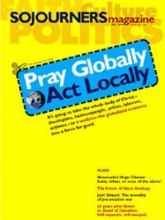Several times during the tumultuous events leading up to the Iraq war, I heard or read the lament, "Where is the Reinhold Niebuhr of our age who can provide wisdom for these insane times?" Thirty years after his death, this Christian social ethicist still has a certain hold on the imagination. The Serenity Prayer, his daughters powerful account of his life, goes a long way to explaining his influence.
While today there is no apparent single heir to the theological mantle of Reinhold Niebuhr, Elisabeth Sifton has written a gem of a book that manages to move seamlessly between the days of war in the middle of the 20th century and our own time of violence. Her vehicle is an extended reflection on the context in which her father wrote the famous Serenity Prayer. She paints a rich tapestry of life in an intellectual orbit that ran from Union Theological Seminary on New York Citys Upper West Side to a small northwestern Massachusetts village named Heath.
As Sifton deftly shows, the initial force of the prayer differed significantly from the version so popular in todays 12-step self-help culture. The original prayer was written by Niebuhr in the summer of 1943 for a church service in Heath; it went like this: "God, grant us grace to accept with serenity the things that cannot be changed, courage to change the things that should be changed, and the wisdom to distinguish the one from the other."
Read the Full Article
